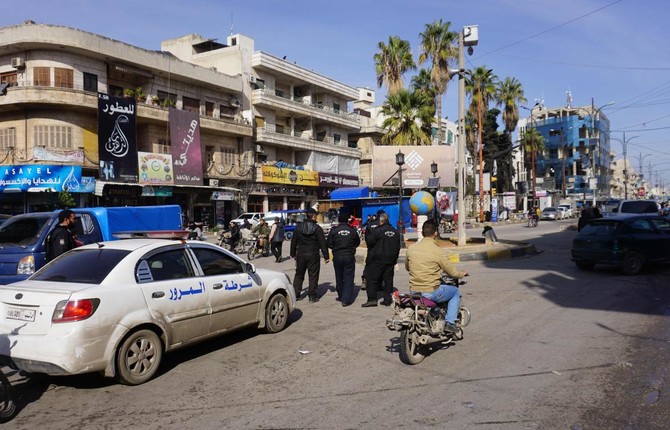Several dead, thousands flee homes in Iraq floods
Gunmen kill two activists in Syria’s rebel-held Idlib province

BEIRUT: Two activists critical of both the regime and militancy were gunned down Friday in Syria’s last major rebel bastion in the northwest of the country, their radio station and a monitor said.
Citizen journalist Raed Fares and Hammoud Al-Juneid were “shot dead by unknown assailants riding in a van in the town of Kafr Nabel” in Idlib province, Fresh FM said on its Facebook page.
More than half of Idlib and the surrounding region is controlled by Hayat Tahrir Al-Sham, an alliance led by militants of Syria’s former Al-Qaeda affiliate, while most of the rest is held by pro-Turkey rebels.
Daesh also has a presence in the province.
Targeted killings and kidnappings have for months plagued Idlib, with angry residents blaming all sides.
The Syrian Observatory for Human Rights, a Britain-based war monitor, said the two men died of their wounds from the attack, for which there was no immediate claim of responsibility.
“They were famous for their criticism of rebels committing violations or arresting civilians, especially when it came to jihadist groups,” Observatory chief Rami Abdel Rahman said.
“Both have several times been detained by Hayat Tahrir Al-Sham,” he said.
Throughout Syria’s seven-year uprising, Fares has been known for his often humorous signs in English and Arabic criticizing President Bashar Assad’s regime.
Fares founded Fresh FM in 2013 to counter “fundamentalist narratives” in Idlib, he has said, after which he was repeatedly targeted by armed groups.
Daesh militants raided the radio’s offices on several occasions, but it was also bombarded by regime forces, he wrote in an op-ed for the Washington Times in June.
“In 2014, I almost lost my life when two armed men opened fire at me and shot me in the chest,” he said.
“I was abducted four times by Al-Qaeda militants and released a few days later after being tortured.”
Fares’s killing was a blow to the few independent voices that have continued to promote nonviolence and democratic change in the war-torn country.
Social media sites were rife with the news of Fares’ killing. “My last friend & hope 4 a better Syria has been killed (today) after being let down by” everyone, Zaina Erhaim, a UK-based Syrian journalist who left the country in 2016, wrote on Twitter.
Fares gained fame during the Syrian uprising because of continued support for opposition protests even when the conflict took a violent turn.
His town gained attention during weekly anti-government protests because of the humorous English-language banners he created for each rally. “Do not send money. Gold is not edible,” one banner read, urging the world to free a besieged area instead of sending assistance.
He organized protests to express support for the victims of the 2013 Boston bombings, which he called “a sorrowful scene of what happens in Syria every day. Do accept our condolences.”
Fares was also a vocal critic of militants, supporting rallies against them, and accusing them of silencing dissent. The Observatory reported that more than 390 people have been shot and killed since April in the rebel-held north amid a wave of assassination and lawlessness.
Mohammed Katoub, a doctor who supports health facilities in rebel-held areas, said public figures and civil society activists are increasingly under threat in northwestern Syria by militant groups. He said at least 13 doctors have disappeared since 2018.
“I think the targeted people are all public figures and community leaders who believe in the same values of humanity, dignity, justice and liberty,” Katoub said. “You can’t know (Fares) without loving him, his smile, his optimism, his hopes for Syria, (his) way of thinking and creativity.”
Al-Juneid, who also worked at the radio, was an advocate for freedom of expression and the rule of law.
“I want freedom of opinion. I want to be able to speak and not be scared,” he said in a video posted on Facebook earlier this year.
A September deal between regime ally Russia and rebel backer Turkey held off a major regime assault to retake Idlib.
But a buffer zone has yet to be implemented around the region, as stipulated by the deal, after militants refused to withdraw from a planned demilitarised area by mid-October.
Syria’s civil war has killed more than 360,000 people and sent millions fleeing from their homes since it started in 2011 with the brutal repression of anti-regime protests.
It has since evolved into a complex conflict involving world powers and militants.




